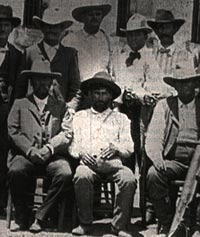GREGORIO CORTEZ (1875-1916)
Born near Matamoros, Mexico, on June 22, 1875, Gregorio Cortez moved with his family to Manor, Texas, when he was two years old. His family stayed in the area and Cortez learned to be a farmer and ranch hand. His reputation as a bandit began in the summer of 1901 when he killed two sheriffs and eluded the Texas Rangers for almost two weeks. Many Tejanos considered him to be a victim of racism and of an inept interpreter; many local Anglos thought Cortez was a violent, bloodthirsty criminal.
Gregorio's troubles began June 12 when the sheriffs in the area were hunting for a horse thief described only as a "medium-sized Mexican." Cortez, along with hundreds of others, fit the ever-so-vague description. What put him in the sights of Sheriff W.T. "Brack" Morris was that he had made a horse trade with an acquaintance, and the sheriff suspected the horse he had traded was the stolen livestock. Morris, along with two deputies (Boone Choate, who acted as interpreter, and John Trimmell) questioned Gregorio at his home in front of several family members. Gregorio said they had no reason to arrest him, but Choate reportedly interpreted the comment as "no white man can arrest me." The comment resulted in the sheriff's firing his weapon and hitting Gregorio's brother Romaldo in the shoulder. Gregorio shot back, killing the sheriff. Although Gregorio escaped, his brother, wife, children, and mother were jailed. Romaldo later died in jail from the gunshot wound he received.Gregorio sought refuge with friends near Belmont, but a posse led by another sheriff tracked him down and another gunfight erupted. When all was said and done, the sheriff and the landowner were dead and Gregorio was on the run again. He managed to evade the Texas Rangers, who pursued him relentlessly for several more days, but a price was on his head. Eventually, an acquaintance gave away his whereabouts and Gregorio was arrested. While serving a fifty-year sentence, Gregorio received a conditional pardon and was released in 1913. He headed south to fight in the Mexican Revolution and died of pneumonia in 1916.
